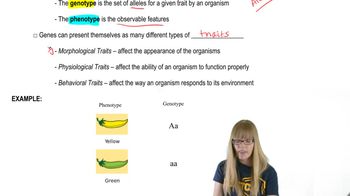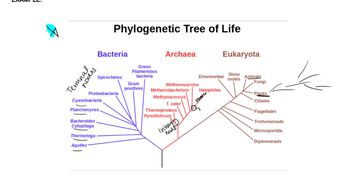Table of contents
- 1. Introduction to Genetics51m
- 2. Mendel's Laws of Inheritance3h 37m
- 3. Extensions to Mendelian Inheritance2h 41m
- 4. Genetic Mapping and Linkage2h 28m
- 5. Genetics of Bacteria and Viruses1h 21m
- 6. Chromosomal Variation1h 48m
- 7. DNA and Chromosome Structure56m
- 8. DNA Replication1h 10m
- 9. Mitosis and Meiosis1h 34m
- 10. Transcription1h 0m
- 11. Translation58m
- 12. Gene Regulation in Prokaryotes1h 19m
- 13. Gene Regulation in Eukaryotes44m
- 14. Genetic Control of Development44m
- 15. Genomes and Genomics1h 50m
- 16. Transposable Elements47m
- 17. Mutation, Repair, and Recombination1h 6m
- 18. Molecular Genetic Tools19m
- 19. Cancer Genetics29m
- 20. Quantitative Genetics1h 26m
- 21. Population Genetics50m
- 22. Evolutionary Genetics29m
22. Evolutionary Genetics
Phylogenetic Trees
Problem 6
Textbook Question
Consider possible societal and ethical dilemmas that might arise if we currently shared the planet with another hominin.
 Verified step by step guidance
Verified step by step guidance1
Identify the key societal and ethical dilemmas that could arise from coexisting with another hominin species.
Consider the implications for human identity and how society might define what it means to be 'human' in the presence of another hominin.
Explore potential issues of rights and equality, such as whether the other hominin species would have the same rights and protections as Homo sapiens.
Discuss the potential for discrimination or conflict between Homo sapiens and the other hominin species, considering historical and contemporary examples of intergroup relations.
Reflect on the ethical considerations of scientific research involving the other hominin species, including issues of consent, exploitation, and preservation of their culture and way of life.
Recommended similar problem, with video answer:
 Verified Solution
Verified SolutionThis video solution was recommended by our tutors as helpful for the problem above
Video duration:
3mPlay a video:
Was this helpful?
Key Concepts
Here are the essential concepts you must grasp in order to answer the question correctly.
Hominin Evolution
Hominins are a group that includes modern humans and our closest extinct relatives. Understanding hominin evolution is crucial for grasping the biological and social implications of sharing the planet with another hominin species. This concept encompasses the evolutionary history, adaptations, and behaviors that distinguish hominins from other primates, highlighting the complexity of human ancestry.
Recommended video:
Guided course

Evolution
Ethical Considerations in Genetics
Ethical considerations in genetics involve the moral implications of genetic research and manipulation, particularly concerning human and non-human species. If another hominin existed, questions about rights, personhood, and the ethical treatment of these beings would arise. This concept emphasizes the need for ethical frameworks to guide scientific advancements and societal interactions.
Recommended video:
Guided course

Descriptive Genetics
Societal Impact of Coexistence
The societal impact of coexistence with another hominin would encompass cultural, social, and economic dimensions. This concept examines how human societies might adapt to share resources, address potential conflicts, and integrate different cognitive and social behaviors. Understanding these dynamics is essential for predicting the challenges and opportunities that could arise in such a scenario.
Recommended video:
Guided course

Artificial Selection

 8:16m
8:16mWatch next
Master Phylogenetic Trees with a bite sized video explanation from Kylia Goodner
Start learningRelated Videos
Related Practice


